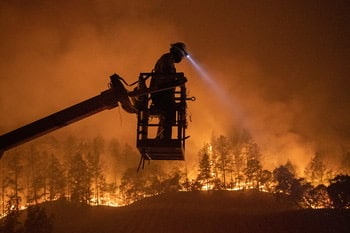- Billions are at risk of missing out on the digital leap forward, as growing disparities challenge the social fabric.
- In the medium-term, the global economy will be threatened by the knock-on effects of the coronavirus crisis, while geopolitical stability will be critically fragile over the next 5 to 10 years.
- Environmental risks continue to threaten: they remain top risks by likelihood and impact in this year’s survey.
The Global Risks Report 2021 is the 16th edition of the Forum’s annual analysis and looks back at a year ravaged by a global pandemic, economic downturn, political turmoil and the ever-worsening climate crisis. The report explores how countries and businesses can act in the face of these risks.
Unsurprisingly, one of the big changes between this year and last, in terms of risks, has been brought about by the COVID-19 coronavirus pandemic. The risk posed by infectious diseases is now ranked at number one, while in 2020 it came in 10th place.

Widespread effects
“The immediate human and economic costs of COVID-19 are severe,” the report says. “They threaten to scale back years of progress on reducing global poverty and inequality and further damage social cohesion and global cooperation.”
For those reasons, the pandemic demonstrates why infectious diseases hits the top of the impact list. Not only has COVID-19 led to widespread loss of life, it is holding back economic development in some of the poorest parts of the world, while amplifying wealth inequalities across the globe.
At the same time, there are concerns the fight against the pandemic is taking resources away from other critical health challenges – including a disruption to measles vaccination programmes.
Climate concerns
But despite the inescapable fallout from COVID-19, it is climate-related matters that make up the bulk of this year’s risk list, which the report describes as “an existential threat to humanity.” Despite a drop in carbon emissions caused by lockdowns and disruption to international trade and travel, there are concerns that as economies start to recover, emissions will soar.

The 2021 risks report draws upon data and insights from a wide array of respondents via the World Economic Forum’s Global Risks Perception Survey. The survey was completed by over 650 members of the Forum’s diverse leadership communities.

One of those communities is the Global Shapers – the Forum’s network of young people driving dialogue, action and change. For them, climate-related risks are seen as “the most likely and most impactful long-term risks.” They also sound a note of caution about the dangers of “youth disillusionment” around the world.
“They see personal risks as immediate threats, macro risks in the medium term and fundamental geopolitical risks in the long term,” the report says.
Among the short-term threats, which are likely to come to fruition within the next two years, are infectious diseases, livelihood crises, digital inequality and youth disillusionment.
As for medium-term risks in next three-to-five years, the Global Shapers identified asset bubble bursts, IT infrastructure breakdown, price instability and debt crises.
In the longer term, the community voiced concerns about weapons of mass destruction, state collapse, biodiversity loss and adverse technological advances.
Countering risks
Alongside the risks listed, the report reflects on responses to COVID-19 to draw lessons that could bolster global resilience.
These include formulating analytical frameworks, creating new forms of partnership and building trust through clear and consistent communication.
It also includes recommendations to help countries and businesses act, rather than react, in the face of risks.
The Forum’s upcoming virtual Davos Agenda event will bring together global leaders to discuss how to advance the principles, policies and partnerships needed to do this.
Source:Weforum.org




